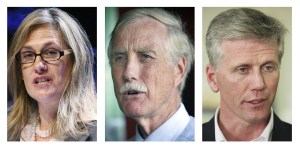Independent former Gov. Angus King has been a subject of negative attacks ads since late July in the Senate race. But the big spending didn’t stop with the Senate race or the gay marriage referendum. Millions of dollars also trickled into legislative races, where Democrats sought to regain control of both chambers.
Many Mainers were ready for it all to come to an end because of the overwhelming level of TV and radio advertising made possible by the Supreme Court’s Citizen United ruling, which allows so-called super PACs to spend unlimited amounts of money on behalf of candidates or issues.
“Because of Citizens United and the staggering amount of capital, the propaganda machine isn’t going to stop,” said Gil Helmick, a frustrated voter in Portland.
Tuesday got off to a cold start with temperatures that were below freezing across the state. But many precincts were busy, and state election officials predicted a strong turnout.
There was no rest for the campaigns Tuesday with candidates making last-minute appearances and final get-out-the-vote push continuing in high gear.
Supporters and opponents of the gay marriage referendum continued working the phones, knocking on doors and waving signs on street corners. Gay marriage supporters even enlisted an airplane to circle downtown Portland, pulling a banner encouraging residents to support same-sex marriage.
Maine voters three years ago rejected a state law legalizing gay marriage but it was back on the ballot thanks to a successful petition drive by gay-marriage supporters. No state has approved same-sex marriage by popular vote, so approval would mark a historic first.
In Portland, though, many voters were more concerned about the economy and the presidential vote.
Kathleen Losier said she voted for Republican Mitt Romney for president because she feels that the nation’s staggering debt is holding back the economy.
“I’m a social liberal but I put those issues aside because our debt problem is more of an issue with me,” said Losier, a 45-year-old registered Republican who lost her shoe industry job, and her health insurance, a decade ago and now works as a merchandising manager.
But Conor Beliveau, who voted for President Barack Obama for another term, said Romney “would set us back 50 or so years” on social issues. “Romney-Ryan would be an absolute fall-in-your face disaster,” said the 30-year-old wellness therapist.
In the Senate race, super PACs spent millions of dollars in Maine in a high-profile race in which Republicans were trying to hang onto the seat vacated by Sen. Olympia Snowe.
Pre-election polls gave King a solid advantage despite months of attack ads targeting his business dealings and his fiscal management of the state as governor from 1995 to 2003.
King said the attacks were continuing in the form of a misleading robocall Monday as he wrapped up his bus tour with a rally outside his campaign headquarters in Brunswick. The robocall from Safe Nation PAC urged progressives to reject King because he “opposes marriage equality.”
“This robocall is the worst case of political sleaziness,” said Crystal Canney, King’s spokeswoman. She said King has always supported marriage equality “and has been on the record for years.”
Also in the race were two other independents, Andrew Ian Dodge and Danny Dalton. A fourth independent, Steve Woods, dropped out, but his name remained on Tuesday’s ballot.
Both congressional races were contested, with Democratic Reps. Chellie Pingree and Mike Michaud facing challenges by Republicans Jon Courtney and Kevin Raye in their respective races.
Mainers also were deciding on a $76 million bond package, including $51.5 million for transportation projects, $11.3 million for capital improvements for universities and community colleges; $7.9 million for public drinking water and wastewater treatment facilities; and $5 million to buy land and conservation easements.
The number of absentee ballots issued by the secretary of state’s office was far fewer than four years ago, but that doesn’t necessarily translate to lower overall voter turnout, officials said.
A total of 188,180 ballots were requested as of Thursday’s deadline and more than 150,000 were returned. The numbers are far less than in 2008, when 238,940 votes were cast via absentee ballots.
State election officials predicted a turnout of 65 percent to 75 percent of the state’s voting population. In 2008, 70 percent of the state’s voting-age residents cast tallies.
The polls opened at 6 a.m. in some locations and 10 a.m. in others. They close at 8 p.m.

Comments are no longer available on this story